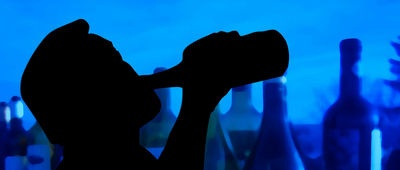|
 The tradition of celebrating meetings with friends with drinks, seeing off, arranging banquets for colleagues on the occasion of the anniversary, awarding an honorary title, promotion and even ending with a libation of a business meeting, unfortunately, has become widespread. The tradition of celebrating meetings with friends with drinks, seeing off, arranging banquets for colleagues on the occasion of the anniversary, awarding an honorary title, promotion and even ending with a libation of a business meeting, unfortunately, has become widespread.
There are many people who cannot deny themselves the pleasure of drinking if they are faced with a treat in the form of alcohol. And this is very worrying. After all, such "ritual" drinking can gradually become the reason for the development of alcoholism in some of their participants - a disease that already requires treatment and which is sometimes very difficult to get rid of.
For example, there is a known case of alcoholism of a respected scientist, who was often invited to banquets for the defense of dissertations and the conferment of an academic title. Among the patients there was also a “professional pusher” who had to “knock out” scarce equipment and raw materials. His activity was not complete without alcohol, which he used for the success of his mission. Making up every time the company to those whom he treated, this man gradually, imperceptibly turned into a patient with withdrawal symptoms, that is, an irresistible attraction to alcohol.
Small, frequent drinks have a huge harm on human health and performance. This was emphasized by many prominent scientists, including S. S. Korsakov, A. A. Pevnitsky, V. M. Bekhterev. The German naturalist Helmholtz pointed out that a small amount of alcoholic beverages reduces creativity, and the great poet Goethe wrote in his diary that his capacity for work and creative imagination was especially strong in those days when he did not drink wine. He said that humanity could achieve incredible success if it were more sober.
Of course, to a certain extent, the spread of alcoholism is also facilitated by the fact that alcohol attracts others with its "intoxicating" action. The person becomes cheerful, talkative and restless. What he just worried about is receding into the background, now seems petty and unworthy of attention. And this, of course, is pleasant to the one who drank. But in the eyes of those around him, he loses a lot: the shy one turns into an unceremonious, modest into a self-righteous braggart, intelligent and delicate into a silly and arrogant. Talkativeness, looseness, unrestrained bragging, cynicism, groundless self-confidence — this is not a complete list of the "intoxicating" effects of alcohol. And if we add to this that the intoxicated person loses the ability for purposeful and thoughtful conversation, that his speech becomes poor, jokes are flat, movements are caricatured, rude and monotonous, then the picture will be quite complete.
 Light intoxication, which comes from a small amount of alcohol, is nothing more than the effect of brain poisoning. After all, alcohol is a strong nervous poison. Its negative influence on intellectual, volitional, emotional functions was experimentally established. It has been proven that even small doses of alcohol cause counting disorders, memory impairment, perception disorders, inability to build judgments, inferences, lead to a decrease in criticism, the ability to control their actions. The outstanding Soviet theoretical physicist Lev Landau said this: "... a New Year's glass of champagne that I have drunk deprives me of my creative activity for a whole month". Light intoxication, which comes from a small amount of alcohol, is nothing more than the effect of brain poisoning. After all, alcohol is a strong nervous poison. Its negative influence on intellectual, volitional, emotional functions was experimentally established. It has been proven that even small doses of alcohol cause counting disorders, memory impairment, perception disorders, inability to build judgments, inferences, lead to a decrease in criticism, the ability to control their actions. The outstanding Soviet theoretical physicist Lev Landau said this: "... a New Year's glass of champagne that I have drunk deprives me of my creative activity for a whole month".
In the vast majority of cases, people usually remember their drunken behavior with disgust and remorse. But ... it is here that the insidiousness of alcohol is revealed: as the drinks are repeated many times, in other words, as they are drawn into drunkenness, the former feelings of repentance and disgust are no longer felt.What psychiatrists call a decline in the level of personality, manifested, in particular, by the loss of self-criticism. This is already a symptom of the transformation of drunkenness - a perverse phenomenon of everyday life, licentiousness - into alcoholism - a serious chronic illness. If a person, like the author of the letter, has been at banquets for a number of years, regularly consumes alcohol during meetings with friends, he acquires the ability to drink already significant doses of alcohol. Or, as experts say, he develops a high tolerance for alcohol. If earlier, for example, for him the maximum dose was 100-150 grams of vodka or cognac, then over time he can drink 300-500 grams or more. Many boast of their ability to tolerate large doses of alcohol, not realizing that this is already a formidable symptom of alcoholism. In parallel with this, the desire for drinking becomes obsessive. It is to satisfy an almost irresistible attraction that such a person looks for reasons for taking alcohol and not only seeks, but also creates them: he strives to participate in banquets, which sometimes is not at all necessary for him, organizes frequent meetings at the table with friends.
So gradually alcohol acquires tremendous power over a person, unquestioningly disposing of him. In this case, not only the central nervous system is affected, but also many other organs. Gastritis, pancreatitis, duodenitis and, finally, liver cirrhosis may develop. If you do not stop drinking alcohol, alcoholism progresses and leads to deep disorders of the central nervous system, up to delirium tremens and complete personality degradation.
Of course, the professional level also gradually decreases, and creative growth stops. Alcohol destroys the family, cripples the lives of children, and is the cause of almost most crimes. And the tragedy begins small - with a few glasses. This must be constantly remembered, especially for those who no longer imagine communicating with friends without libations.
There are many people who claim that they drink just because they often have to attend conferences, symposia, business meetings, which are customary to end with banquets, and it is inconvenient for them not to drink. But this is a delusion or an excuse. The official position of a person who abstains from alcohol at a banquet or reception will not be shaken in any way because of this.
 Indeed, are "ritual" drinks really necessary? Remember at least an episode from the film “I beg you to speak”, in which the chairman of the city executive committee receives the French delegation. Someone suggests including cognac in the meeting program. But the proposal by the chairman of the city executive committee is categorically rejected. Refusal from alcohol does not detract from the merits of the film's heroine, her high official position. Indeed, are "ritual" drinks really necessary? Remember at least an episode from the film “I beg you to speak”, in which the chairman of the city executive committee receives the French delegation. Someone suggests including cognac in the meeting program. But the proposal by the chairman of the city executive committee is categorically rejected. Refusal from alcohol does not detract from the merits of the film's heroine, her high official position.
On the contrary, someone who is often tempted to drink should especially actively develop a negative attitude towards drinking, conduct so-called anti-alcohol auto-training, not be shy about giving up alcohol, regardless of whether it is vodka, cognac, wine or champagne. It is available to everyone. As for the frequent friendly feasts with the use of alcoholic beverages, it should be said that they are not at all necessary. Friendship is not cemented by alcohol, but a company of friends who are united by vodka is just a society of drinking companions.
What if "circumstances force"? Yes, first of all, to reduce this kind of pleasure. For example, spend a Sunday day with friends not at the table, but in nature, wander along the forest roads, breathe fresh air. We must strive for such pleasures and entertainment that spiritually, morally and intellectually enrich.
And even if you happen to take part in a feast with friends or attend an official banquet, you can drink symbolically only by sipping a glass, say, the whole evening.
A. A. Portnov, V. P. Zukhar
Read now
All recipes
|
 The tradition of celebrating meetings with friends with drinks, seeing off, arranging banquets for colleagues on the occasion of the anniversary, awarding an honorary title, promotion and even ending with a libation of a business meeting, unfortunately, has become widespread.
The tradition of celebrating meetings with friends with drinks, seeing off, arranging banquets for colleagues on the occasion of the anniversary, awarding an honorary title, promotion and even ending with a libation of a business meeting, unfortunately, has become widespread. Light intoxication, which comes from a small amount of alcohol, is nothing more than the effect of brain poisoning. After all, alcohol is a strong nervous poison. Its negative influence on intellectual, volitional, emotional functions was experimentally established. It has been proven that even small doses of alcohol cause counting disorders, memory impairment, perception disorders, inability to build judgments, inferences, lead to a decrease in criticism, the ability to control their actions. The outstanding Soviet theoretical physicist Lev Landau said this: "... a New Year's glass of champagne that I have drunk deprives me of my creative activity for a whole month".
Light intoxication, which comes from a small amount of alcohol, is nothing more than the effect of brain poisoning. After all, alcohol is a strong nervous poison. Its negative influence on intellectual, volitional, emotional functions was experimentally established. It has been proven that even small doses of alcohol cause counting disorders, memory impairment, perception disorders, inability to build judgments, inferences, lead to a decrease in criticism, the ability to control their actions. The outstanding Soviet theoretical physicist Lev Landau said this: "... a New Year's glass of champagne that I have drunk deprives me of my creative activity for a whole month". Indeed, are "ritual" drinks really necessary? Remember at least an episode from the film “I beg you to speak”, in which the chairman of the city executive committee receives the French delegation. Someone suggests including cognac in the meeting program. But the proposal by the chairman of the city executive committee is categorically rejected. Refusal from alcohol does not detract from the merits of the film's heroine, her high official position.
Indeed, are "ritual" drinks really necessary? Remember at least an episode from the film “I beg you to speak”, in which the chairman of the city executive committee receives the French delegation. Someone suggests including cognac in the meeting program. But the proposal by the chairman of the city executive committee is categorically rejected. Refusal from alcohol does not detract from the merits of the film's heroine, her high official position.






